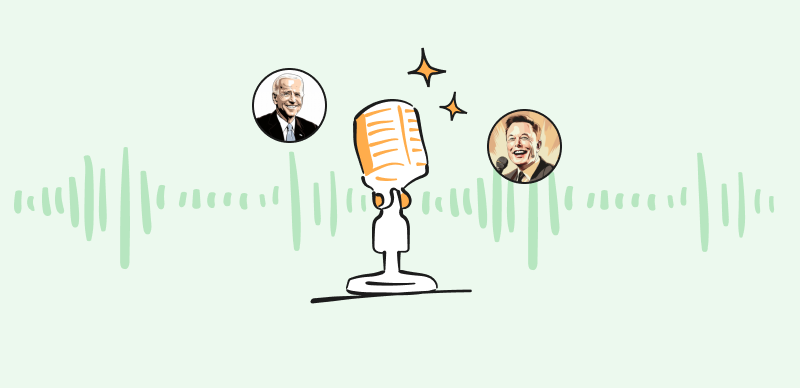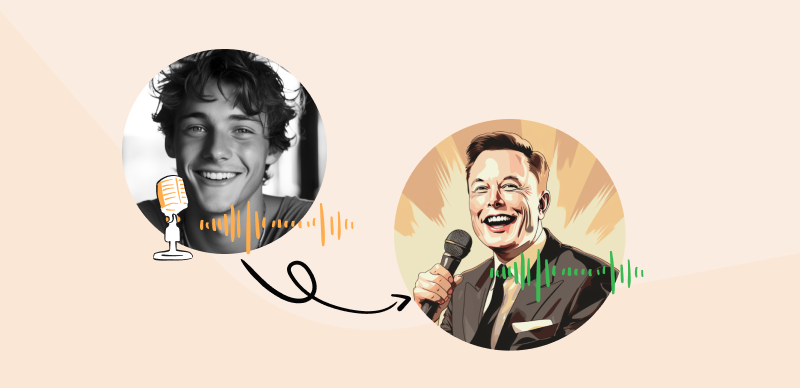Have you ever imagined a world where your favorite celebrity’s voice could be replicated and used on various digital platforms? Thanks to cutting-edge technology, this is now possible! Rihanna, the singing sensation, has not just given us hit after hit; now a wave of “Rihanna ai voice” is catching attention.
The Rihanna AI voice generator is the new frontier in digital audio, from voiceovers to creating new music. With technology advancing rapidly, several companies have stepped into the celebrity voice generators‘ domain, offering tools that can mimic Rihanna’s iconic voice with impeccable accuracy. This guide will explore some of the best Rihanna AI voice generators and their unique features.
Also Read: 5 Best Voice Changers for Discord Chromebook >
What Is Rihanna’s AI Voice?
The Rihanna AI voice is a technological innovation that might seem like something from a science fiction movie. Think about it: an artificial version of Rihanna’s voice, constructed using the wonders of artificial intelligence. But how does this work? Well, deep within this tech lie neural networks. Picture these as complex webs, similar to the human brain’s networks, processing and analyzing vast amounts of data. For the Rihanna AI voice, this data comes from hours and hours of her songs, her interviews, and any instance where she’s spoken or sung.

Rihanna AI Voice Generator
As the AI sifts through this immense audio treasure trove, it slowly picks up the finer details of her voice. It teaches how she might stretch a note, emphasize certain words, and even the delicate timbre and resonance that make her voice uniquely hers. This learning process is repetitive and thorough. With each pass, the AI gets better, refining its understanding. Once this learning phase reaches a certain point, the AI can create voice clips that sound like Rihanna, Stephen Hawking, Joe Biden, Simon Cowell, Jenna Ortega, and many other celebrities. It’s like having a digital version of her voice ready to be used creatively. Imagine using it in animations, fan-made videos, or even digital games. It’s a fun and exciting avenue for fans and creators to explore Rihanna’s voice in completely new digital landscapes.
What Is the AI-Generated Song Rihanna?
When we talk about an AI-generated song using Rihanna’s voice, it’s essential to clarify something: Rihanna didn’t sing it herself. Instead, this is where the artificial intelligence, trained intensively on Rihanna’s vocal style, steps into the spotlight. It’s the AI that sings, drawing from its extensive training to produce vocals bearing a remarkable resemblance to Rihanna’s own.
But the process doesn’t stop at just replicating her voice. The AI digs deeper. It understands rhythms, discerns melodies, and can even develop lyrics independently. In essence, it can craft an entire song from scratch. Imagine switching on the radio and hearing a song that sounds exactly like Rihanna’s style, voice, and essence, but it’s a tune you’ve never heard. That’s the power of AI-generated music.
To many, this technology presents a new frontier, reshaping how we think about music creation. While some might be skeptical, questioning if a machine can truly capture the soul and emotion of a human artist, there’s no denying its potential. With AI, the music world stands on the cusp of a revolution, expanding the boundaries of creativity and offering a peek into a future where human artistry and machine intelligence harmoniously blend.
Top 3 Rihanna AI Voices Generators
Now that we know about Rihanna’s AI voice let’s take a closer look at the top three tools that can help you create that sound for yourself.
MagicMic
MagicMic is a contemporary tool designed for both fun and professional use. Its primary aim is to transform the user’s voice, mimicking the tones of global icons like Rihanna. Its seamless user interface makes voice altering a breeze, suitable for pranking friends, enhancing game experiences, or even for professional recordings.
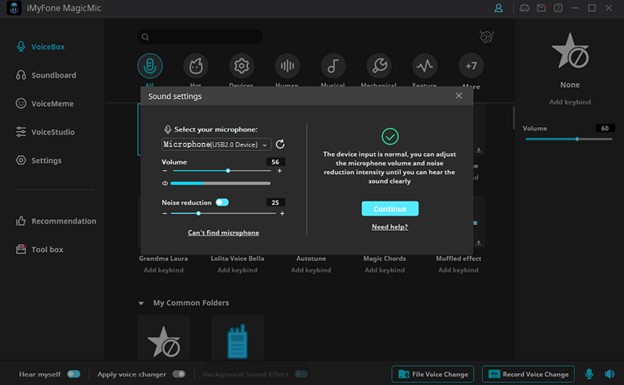
Rihanna AI Voices Generator – MagicMic
MagicMic’s Features
- A rich library of over 600 sound effects to choose from.
- Various voice filters, including those of famous singers like Rihanna.
- The ability to customize and tweak the altered voices, helping users achieve a distinctive vocal style.
- Instant voice modifications are possible through key binds, especially beneficial for live streams.
- A voice recording function allows users to store and revisit modified voices.
Price
- Monthly: $16.99 ($0.33 per day)
- Lifetime: $74.99 (Special offer: $49.99 for lifetime access)
- Yearly: Information not provided in the given data
AIVA
AIVA stands out as a comprehensive platform for music creation. Instead of just being a voice-changer, it delves into music composition, offering users the flexibility to craft songs from scratch or modify existing compositions. With a user-friendly interface, AIVA makes music generation easy and accessible!
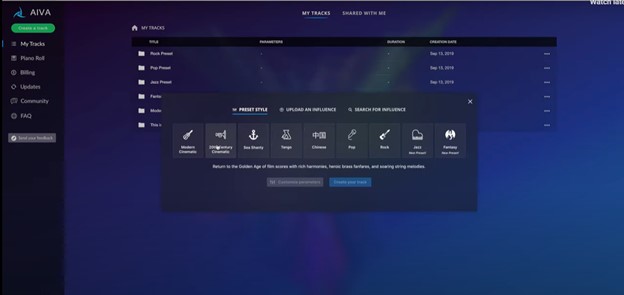
Rihanna AI Voices Generator – AIVA
AIVA’s Features
- Customized music generation based on various musical parameters like time signature, key signature, tempo, etc.
- A vast public profiles library that allows users to leverage existing compositions for their unique twists.
- Several preset styles spanning genres like jazz, pop, rock, and trap.
- Option to upload an “influence”, ensuring originality in the composition.
Price
- Free Subscription: 3 free downloads monthly (max duration: 3 minutes). Credit to AIVA is required, and no monetization is allowed.
- 15 Euros/month: 15 free downloads, max duration of 5 minutes, and permitted monetization on platforms like TikTok, YouTube, and Twitch.
- 49 Euros/month: Full copyright to the user, 300 downloads monthly, and full monetization privileges.
Soundful AI Music Generator
SOUNDFUL offers an enriching and cost-effective musical experience targeted at producers, creators, and brands. By merging AI technology with musical creativity, it provides solutions for those occasional bouts of creative block, making it a handy tool in any producer’s arsenal.
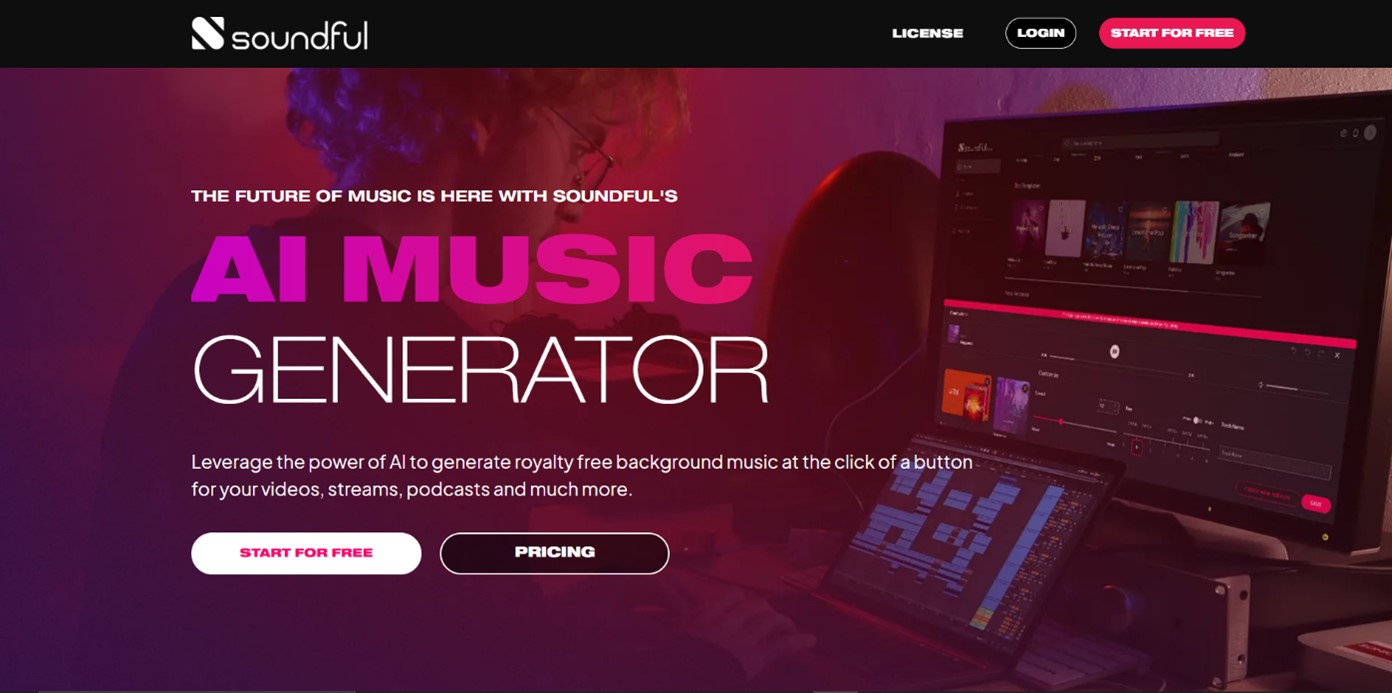
Rihanna AI Voices Generator – Soundful AI Music Generator
Soundful’s Features
- Genre-based song creation, with choices ranging from rap to Latin.
- In-depth customization using templates, song speed, key signature, and track names.
- Global Tracks section showcases a diverse collection of songs from various moods and genres.
- Availability of stems, offering audio files segmented into melody, bass, drums, and instruments, facilitating enhanced creative freedom.
Price
- Free Subscription: Over 50 templates, ten monthly downloads, unlimited track creation, and one stem download per month.
- Commercial Use: $9.99/month or $7.99/month (yearly). Unlimited track downloads, five monthly stem downloads, and extensive online platform coverage.
- Customized Plan: Tailored for organizations, pricing is determined after a consultation. Features custom templates, custom licensing terms, and expansive content usage rights.
How to Use Rihanna AI Voice Generators?
MagicMic is an intuitive platform that lets users create voice effects, including the sought-after Rihanna AI voice. If you’re new to this, don’t fret! Here’s a simple, step-by-step guide to get you started:
1. Begin by downloading and installing the MagicMic software. Once done, open it up and sign in using your registered email.
2. Once inside, you’ll find options to personalize your settings. Adjust the input according to your needs, tweak program preferences, and activate the features you’re interested in.
3. This step ensures that your voice changes with MagicMic are heard in your software or application. So, head to the application’s audio settings and select ‘MagicMic Virtual Audio Device’ as the primary input.
Now, the fun begins! Dive into a world of different voice effects. You can experiment with various tones, assign quick-access buttons (key binds) for affects you love, and make the experience your own.
Remember, practice makes perfect. So, take your time to explore and play around with the settings. Before you know it, you’ll be mastering the Rihanna AI voice effect!
Final Thought
The rise of AI technologies, especially in the entertainment industry, is astounding. The Rihanna AI voice generators stand as a testament to how far we’ve come in mimicking the unique tonal qualities of iconic voices. It’s exciting to think about the future possibilities and applications of the Rihanna AI voice, from video games to virtual reality and beyond. But, as we marvel at these advancements, we must approach them with respect for the artists and technology. What do you think about experimenting with a Rihanna ai voice generator? How do you see this evolving in the coming years? Please share your insights with us and join the conversation on this fascinating fusion of music and machine learning.


